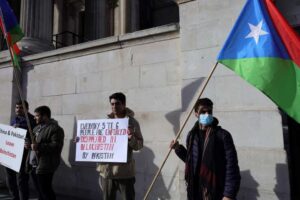Indian State Should Abandon Overreliance on Conventional Warfare; Instead Focus on Unconventional Methods: Jamal Nasir Baloch

By Mark Kinra
After the recent short but intense India-Pakistan military skirmish, the like of which was last seen in 1971 war, Pakistan’s province of Balochistan also witnessed heightened attacks by Baloch separatist groups. After the ceasefire, much of the Indian and international media’s attention began focussing on Balochistan. To understand where the Baloch movement was headed to, Mark Kinra spoke to Jamal Nasir Baloch, currently head of Foreign Affairs Department of Free Balochistan Movement (
Excerpts:
How do you see the current India-Pakistan military skirmish?
During the incident, the US Secretary of State, Marco Rubio, did not contact his Pakistani counterpart, Ishaq Dar, nor did he reach out to Prime Minister Shehbaz Sharif. Instead, he spoke directly with Pakistan’s Army Chief, General Asim Munir, to discuss the India–Pakistan skirmish. It is an open secret within the international community that Pakistan is a sham democracy controlled by its military. Consequently, both domestically and internationally, the Army Chief often functions as the de facto head of state.
Prior to the 2025 Pahalgam attack and the current military skirmish between India and Pakistan, Indian Prime Minister Narendra Modi had made a deal with Pakistan’s former Army Chief, General Qamar Javed Bajwa, following the failed Balakot airstrike of 2019, during which Pakistan captured Indian pilot Abhinandan Varthaman. A series of secret meetings between Modi and Bajwa’s team culminated in a long-term agreement. At the time, Pakistan’s economy was in decline and required international loans, prompting the country to adopt policies palatable to the West and its lenders.
Either there is soft spot or India lacks a deep understanding of the nature of the Pakistani state. This is something I had anticipated in a 2019 article, in which I wrote: “If billions of American dollars failed to change Pakistan’s behaviour, and it continued to support the Taliban despite receiving such aid, then why would the trade of tomatoes and onions alter Pakistan’s anti-Indian stance?”
They ignored a fundamental truth: if one Army Chief—Bajwa—could broker a deal, another—Asim Munir—could easily break it. Bajwa’s departure marked the end of his policies.
Smaller Gulf states such as Qatar and the United Arab Emirates now demonstrate greater political maturity and hold more influence in the region. This underscores a simple fact: it is not the size of a state or the scale of its population that determines power, but rather its strategic approach.
Today’s Baloch political youth are expressing their views with a greater sense of realism. Many Baloch activists are asking valid questions: Why should we trust the Modi government and India, when Modi himself placed trust in the Pakistani military and made a deal with Pakistan’s former army chief, General Bajwa? Why should the Baloch only appeal to India and the Western democracies? Shouldn’t we build relationships with all countries that have interests in Balochistan, including China, Russia, Qatar, Israel, Saudi Arabia, the United Arab Emirates, etc.?
One of Balochistan’s gold mines, Saindak, is being looted by China, and another, Reko Diq, is being looted by the Canadian company Barrick Gold. Then why should we treat China as an enemy but regard Western democracies as friends, when they are pursuing the same exploitative policies against the Baloch nation and Balochistan?
Why should we support one camp and direct our energies against another when both are working against us? Why should we commit to and regard India as a friend when no state, including India, has yet supported our just and legal cause for national liberation?
 How do you see Gulbuddin Hekmatyar’s negative statement on independence of Balochistan?
How do you see Gulbuddin Hekmatyar’s negative statement on independence of Balochistan?
I have read a translation of his statement, and it is clear that Hekmatyar holds no real significance in Afghanistan today. Afghans are well aware that for over 45 years, he collaborated with the ISI to undermine their country. He served as a proxy for Pakistan, and his recent remarks appear to echo the official narrative of the Pakistan Army.
First and foremost, Afghan—or more accurately, Pashtun—relations with the Baloch nation are deeply historical. Our cooperation predates the formation of modern Afghanistan under Ahmad Shah Durrani. For millennia, we have lived as neighbours, and more often than not, our two nations have chosen peace and cooperation over conflict and war.
If Hekmatyar considers Pakistan a friend, then one must ask: why did Pakistan occupy and never return Afghan territories that were divided and seized by the British Empire through the imposition of the Durand Line? Was Pakistan not created for Indian Muslims who feared Hindu domination? If that is the case, why did Muslim Punjabis require the land of Pashtun Muslims? Why did they feel the need to invade and occupy Balochistan?
If Hekmatyar insists on invoking religion in the realm of geopolitics, then he must first confront and answer these fundamental questions.
As for Iran, it too is an occupying force. Since the 1920s, the regime has engaged in a campaign of ethnic cleansing against the Baloch people. The sooner the Shia fascist regime collapses, the better it will be for all freedom-loving nations.
What do you think about American geopolitics being played out in the region with regard to the Baloch question?
America behaves like a typical conservative capitalist buyer: it wants the end product but shows little concern for the source.
Pakistan plays the role of the seller—offering military services, weapons, natural resources, and even its sovereignty—for the right price. At this very moment, a senior American general or bureaucrat is likely thinking: Why should we support the Baloch liberation movement, if the Baloch are so weak and ineffective that they cannot prevent Pakistan from plundering their underground resources—copper, gold, oil, and gas?
Why would the United States need the Baloch, when every port and airport—military or civilian—in Balochistan is entirely under the control of the Pakistan Army? Why should they consider the Baloch relevant, when we have yet to master the basics of democratic consensus, have failed to establish a unified military command and control structure, and still often behave like 18th-century warlords?
Pakistan, despite its many weaknesses and betrayals—including its support for the Taliban during the Afghan war and the harbouring of Osama bin Laden—is still perceived as a more reliable partner. The reason? Pakistan can deliver, whereas the Baloch, at present, cannot. Geopolitics rewards capability, not sentiment.
Only when the Baloch demonstrate a shift in their political and organisational capacity—when our parties embrace democratic cooperation, when Baloch armed groups behave as disciplined national forces with a unified command—will the equation begin to change.
Do you think India will think differently now on the issue of Balochistan?
I would like question to answered differently, something to ponder for the Indian Government and Indian people. Thus far, the Indian government’s policy has been penny wise and pound foolish. Consider the actual cost inflicted on India by Pakistan. Twenty-six Indians lost their lives in a Pakistan-backed terrorist attack in Pahalgam—some of the victims were identified as members of the Intelligence Bureau, Navy, and Air Force.
Following the Indian missile strikes inside Pakistan on 7th May, both sides engaged in conventional and drone warfare. According to some Western media outlets, India lost a Rafale fighter jet—each of which costs around $100 million USD. The Israeli-made Harop drones, reportedly used in the operation, cost at least $700,000 USD per unit, and India is said to have deployed at least ten of them to strike targets inside Pakistan.
This does not even take into account other losses: the decline in the stock market, the hit to tourism in Kashmir, casualties among Indian soldiers during clashes along the Line of Control, the cost of heavy artillery deployments, and more. In just a few days of military skirmishes, the total cost to the Indian government may well have run into the hundreds of millions of dollars.
Now ask: how much would it cost India to support Baloch political parties in bringing legal cases against Pakistan on the grounds that a sovereign nation was forcibly occupied? How much would it cost to arm and enhance the capabilities of the armed groups fighting for Baloch liberation? How much would it take to support the international lobbying efforts of Baloch political organisations? Much less than it cost India during this crisis. If the Indian state retains even a shred of strategic sense, it would abandon its overreliance on conventional warfare and instead shift its focus towards unconventional methods.